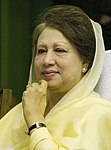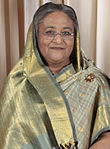General elections were held in Bangladesh on 1 October 2001. The 300 seats of the Jatiya Sangsad were contested by 1,935 candidates representing 54 parties and 484 independents. The elections were the second to be held under the caretaker government concept, introduced in 1996.
| |||||||||||||||||||||||||||||||||||||||||||||||||||||||||||||||||||||||
All 300 seats in the Jatiya Sangsad 151 seats needed for a majority | |||||||||||||||||||||||||||||||||||||||||||||||||||||||||||||||||||||||
|---|---|---|---|---|---|---|---|---|---|---|---|---|---|---|---|---|---|---|---|---|---|---|---|---|---|---|---|---|---|---|---|---|---|---|---|---|---|---|---|---|---|---|---|---|---|---|---|---|---|---|---|---|---|---|---|---|---|---|---|---|---|---|---|---|---|---|---|---|---|---|---|
| Registered | 74,946,364 | ||||||||||||||||||||||||||||||||||||||||||||||||||||||||||||||||||||||
| Turnout | 74.97% | ||||||||||||||||||||||||||||||||||||||||||||||||||||||||||||||||||||||
| |||||||||||||||||||||||||||||||||||||||||||||||||||||||||||||||||||||||
 Results by constituency | |||||||||||||||||||||||||||||||||||||||||||||||||||||||||||||||||||||||
| |||||||||||||||||||||||||||||||||||||||||||||||||||||||||||||||||||||||
The result was a win for the Four Party Alliance of the Bangladesh Nationalist Party (BNP), Jamaat-e-Islami Bangladesh, Jatiya Party (Manju) and Islami Oikya Jote. BNP leader Khaleda Zia became Prime Minister.
Background
The Seventh Parliament headed by Prime Minister Sheikh Hasina was dissolved on 13 July 2001,[1] having completed its designated 5-year term (the first parliamentary administration to ever do so)[2] and power was transferred to the caretaker government headed by Justice Latifur Rahman.
Electoral system
The 300 members of the Jatiya Sangsad were elected by first-past-the-post voting in single-member constituencies.[3] The law providing for 30 seats reserved for women had expired prior to the elections.[4]
Conduct
The international[5] and national monitors declared the polling free and fair despite the Awami League alleging massive vote rigging by the BNP. The accusation was denied by the Chief Election Commissioner, who declared the charges "baseless".[6] International observers, from the European Union, the United Nations and the Carter Center[7] of former US President Jimmy Carter, also praised the heavy voter turnout, which was 75%.[2]
Results
The BNP were the clear winners in terms of seats, winning a secure majority with 193 (of 300) seats. BNP's allied parties Jamaat-e-Islami Bangladesh, Jatiya Party (Manju) and Islami Oikya Jote also won a combined 23 seats, bringing the alliance total to 216 seats. As a result of the first-past-the-post voting system in Bangladesh, Awami League only secured 62 seats, despite a difference in popular vote share of only ≈1.4%. Voter turnout was very high at 75%.[2]
Of the 300 seats, only seven were won by women.[8]
| Party | Votes | % | Seats | |
|---|---|---|---|---|
| Bangladesh Nationalist Party | 22,833,978 | 40.97 | 193 | |
| Awami League | 22,365,516 | 40.13 | 62 | |
| Islami Jatiya Oikya Front | 4,038,453 | 7.25 | 14 | |
| Bangladesh Jamaat-e-Islami | 2,385,361 | 4.28 | 17 | |
| Bangladesh Jatiya Party | 621,772 | 1.12 | 4 | |
| Islami Oikya Jote | 376,343 | 0.68 | 2 | |
| Krishak Sramik Janata League | 261,344 | 0.47 | 1 | |
| Jatiya Party (Manju) | 243,617 | 0.44 | 1 | |
| Jatiya Samajtantrik Dal | 119,382 | 0.21 | 0 | |
| Communist Party of Bangladesh | 56,991 | 0.10 | 0 | |
| Workers Party of Bangladesh | 40,484 | 0.07 | 0 | |
| Bangladesh Islami Front | 30,761 | 0.06 | 0 | |
| BASAD–Khalekuzzaman | 21,164 | 0.04 | 0 | |
| Jamiat Ulema-e-Islam Bangladesh | 19,256 | 0.03 | 0 | |
| Bangladesh Khilafat Andolan | 13,472 | 0.02 | 0 | |
| Gano Forum | 8,494 | 0.02 | 0 | |
| Islami Shasantantra Andolon | 5,944 | 0.01 | 0 | |
| Liberal Party Bangladesh | 3,976 | 0.01 | 0 | |
| National Awami Party (NAP) | 3,801 | 0.01 | 0 | |
| Bangladesh Progressive Party | 3,734 | 0.01 | 0 | |
| Ganatantri Party | 3,190 | 0.01 | 0 | |
| Bangladesh Samajtantrik Dal | 2,308 | 0.00 | 0 | |
| Bangladesh Janata Party | 1,703 | 0.00 | 0 | |
| Bangladesh Krishak Sramik Mukti Andolon | 1,248 | 0.00 | 0 | |
| Jaker Party | 1,181 | 0.00 | 0 | |
| Bangladesh Peoples Congress | 1,155 | 0.00 | 0 | |
| Communist Kendra | 1,042 | 0.00 | 0 | |
| Communist Party of Bangladesh (Marxist–Leninist) | 972 | 0.00 | 0 | |
| Bangladesh Hindu League | 922 | 0.00 | 0 | |
| Gano Azadi League | 780 | 0.00 | 0 | |
| Jatiyo Janata Party (Adv. Nurul Islam Khan) | 657 | 0.00 | 0 | |
| Bangladesh Muslim League (Jamir Ali) | 582 | 0.00 | 0 | |
| National Patriotic Party | 551 | 0.00 | 0 | |
| National Awami Party (Bhashani) | 442 | 0.00 | 0 | |
| Bangladesh Jatiya Tanti Dal | 441 | 0.00 | 0 | |
| Samridha Bangladesh Andolon | 429 | 0.00 | 0 | |
| Sramik Krishak Samajbadi Dal | 391 | 0.00 | 0 | |
| Bangladesh Peoples Party | 382 | 0.00 | 0 | |
| Desh Prem Party | 366 | 0.00 | 0 | |
| Democratic Republican Party | 364 | 0.00 | 0 | |
| Bangladesh Manabadhikar Dal | 237 | 0.00 | 0 | |
| Bangladesh Krisak Sramik Janata Party | 197 | 0.00 | 0 | |
| Liberal Democrats Party | 170 | 0.00 | 0 | |
| Quran Darshan Sangstha Bangladesh | 161 | 0.00 | 0 | |
| Jatiya Janata Party (Sheik Asad) | 148 | 0.00 | 0 | |
| Pragatishil Ganotantrik Shakti | 136 | 0.00 | 0 | |
| Sama-Samaj Ganotantri Party | 131 | 0.00 | 0 | |
| National Awami Party (NAP-Bhashani Mushtaq) | 79 | 0.00 | 0 | |
| Quran and Sunnah Bastabayan Party | 77 | 0.00 | 0 | |
| Bhashani Front | 76 | 0.00 | 0 | |
| Bangladesh Krishak Sramik Awami League | 59 | 0.00 | 0 | |
| Bangladesh Bhashani Adarsha Bastabayan Parishad | 58 | 0.00 | 0 | |
| Bangladesh Sarbahara Party | 44 | 0.00 | 0 | |
| Jatiya Janata Party (Hafizur) | 30 | 0.00 | 0 | |
| Independents | 2,262,073 | 4.06 | 6 | |
| Total | 55,736,625 | 100.00 | 300 | |
| Valid votes | 55,736,625 | 99.20 | ||
| Invalid/blank votes | 449,082 | 0.80 | ||
| Total votes | 56,185,707 | 100.00 | ||
| Registered voters/turnout | 74,946,364 | 74.97 | ||
| Source: ECB | ||||
Aftermath
There were reports of violence targeting minority Hindus in the immediate wake of the elections.[9]
With a clear majority BNP leader Khaleda Zia was invited to form a government and on 10 October 2001, was sworn in as Prime Minister and formed her Cabinet, which included members of her allied parties. The first sitting of the Eighth Parliament occurred on 28 October 2001[1] with Jamiruddin Sircar as its new Speaker.
In 2004 a constitutional amendment was passed, reinstating the reserved seats for women and increasing the number from 30 to 45. The seats were now allocated based on the proportion of seats won by each party rather than being elected by directly elected MPs. The reserved seats were to be allocated on 6 September 2005, but the Awami League refused to nominate candidates for the nine seats the party was entitled to in protest at the seats not being directly elected. On 2 October the nine vacant seats were reallocated, of which six went to the BNP. After the reallocation the BNP had 36 reserved seats, Islami Jatiya Oikya Front four, Bangladesh Jamaat-e-Islami three and the Bangladesh Jatiya Party and Islami Oikya Jote one each.[10][11][8]
Zia's administration completed a full five-year term, running from 28 October 2001 to 27 October 2006. However, disputes over the selection of a caretaker government, with disagreements between the parties over their neutrality, led to the 2006–08 Bangladeshi political crisis, which eventually resulted in military intervention. New elections were not held until December 2008.


